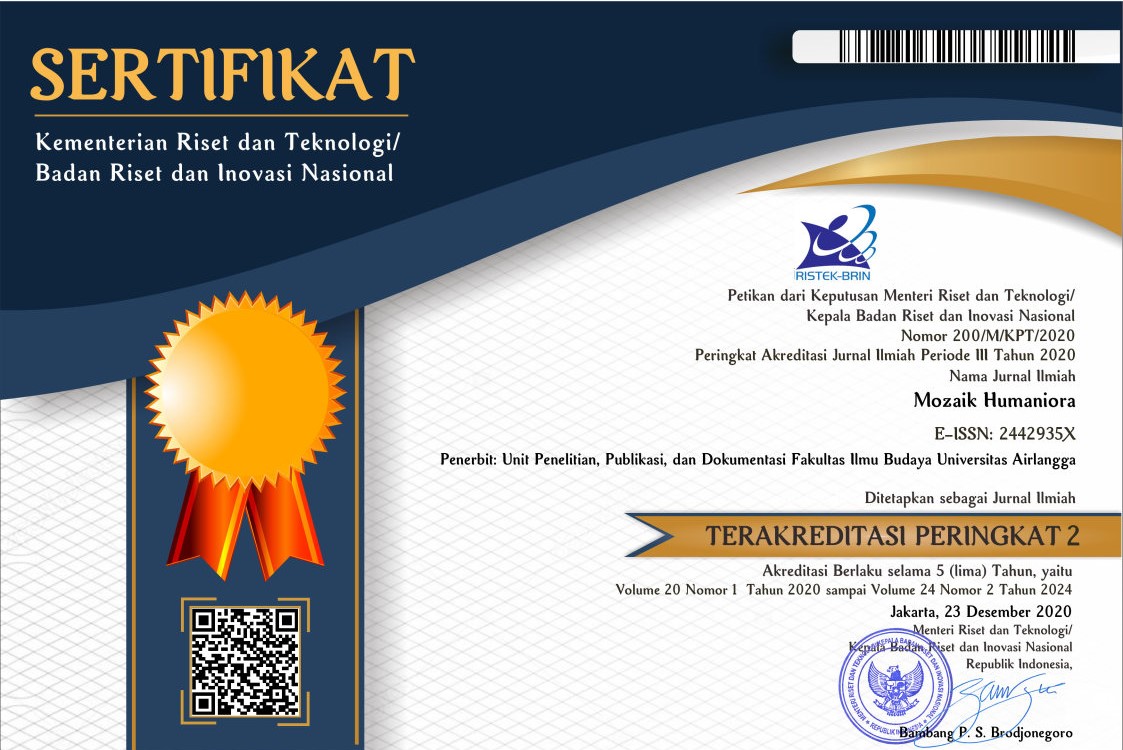Destabilizing Gender Norm in Contemporary Indonesian Discourses
Downloads
Bakhtin, M. M. 1980. Art and Answerability: Early Philosophical Essays. 1st ed. Austin: University of Texas Press.
Bakhtin, M.M. 1984. Problems of Dostoevsky's Poetics. Edited by Caryl Emerson. Minneapolis, MN: University of Minnesota Press.
Bakhtin, M.M. 1992. The Dialogic Imagination: Four Essays. Austin: University of Texas Press.
Blackburn, Susan, 2004. Women and the State in Modern Indonesia. New Yok: Cambridge University Press
Butler, Judith. 1990. Gender Trouble: Feminism and the Subversion of Identity. London and New York: Routledge
Braidotti, Rosi. 1997. "Mother, Monsters and Machines," in Writing on the Body, Female Embodiment and Feminist Theory. Ed. Katie Conboy, Nadia Median, Sara Stanbury. New York: Columbia University Press, 59-79.
Connell, R.W. 1995. Masculinities. Berkeley: University of California Press
Friedan, Betty. 1963. The Feminine Mystique. New York: W.W. Norton
Hasits, Muhammad. 2013. "KPI Minta Stasiun TV Setop Adegan Pria jadi Bencong”, in Merdeka.com. Monday, 30 December, downloaded on 12 January 2014
Holquist, Michael. "Answering as Authoring: Mikhail Bakhtin's Trans-Linguistics." Critical Inquiry 10 (1983): 307-319.
Holquist, Michael. 1990. Dialogism: Bakhtin and his World. London; New York: Routledge.
Irawan, Benny. 2014. Menjadikan Indonesia: Politik Identitas Nasional dalam Buku Teks Sekolah Dasar. Yogyakarta: Sekolah Pascasarjana Universitas Gadjah Mada, unpublished thesis.
Marching, Soe Tjen. 2007. "Descriptions of Female Sexuality in Ayu Utami's Saman”, in Journal of Southeast Asian Studies , Vol. 38, No. 1 , February. Pp. 133-146.
Noviani, Ratna. 2012. "Bencana dalam Narasi Media: Kajian Naratif Berita tentang Erupsi Merapi 2010 dalam program Breaking News Metro TV” in Merapi dalam Kajian Multidisiplin by Hasse J, Ferry Muhammadsyah Siregar and Pradiastuti (eds), Yogyakarta: Graduate School Universitas Gadjah Mada pp. 3-28.
O'Rourke, K. 2002. Reformasi : The Struggle for Power in Post-Soeharto Indonesia. New South Wales : Allen & Unwin.
Paramadhita, intan. 2011. "Contesting Indonesian Nationalism and Masculinity on Cinema”. In Asian Cinema, Fall/Winter 2007 .Vol. 18 no. 2
Retaduari, Elza Astrari. 2015. UNDP: LGBT di Indonesia Masih Alami Diskriminasi hingga Kriminalisasi
Todorov, Tzvetan. 1984. Mikhail Bakhtin: The Dialogical Principle. Translated by Wlad Godzich. Minneapolis, MN: University of Minnesota Press.
Tuchman, Gaye. 1978. The Symbolic Annihilation of Women by the Mass Media.
Sen Krishna and David T. Hill, 2000. Media, Culture and Politics in Indonesia, Oxford University Press, Melbourne.
Suryakusuma, Julia. 2011. Ibuisme Negara. Jakarta: Komunitas Bambu
Syaiful. 2013. Kampanye Gay dan Lesbian, Tayangan Pesbukers Harus Dihentikan in Suara Islam.com, 9 July uploaded at 10:17:48
Wiyatmi, 2010. "Konstruksi Gender dalam Novel Geni Jora Karya Abidah El-Khalieqy”. In Humaniora, Vol 22. No 2, 196-206
Wishermann, Ulla & Ilze Klavina Mueller. 2004. "Feminist Theories on the Separation of the Private and the Public: Looking Back, Looking Forward” in Women in German Yearbook 2004, 184-197.
Wieringa, Saskia. 1995. "Matrilinearity and Women's Interest: the Minangkabau of Western Sumatra” in Saskia Wieringa (Ed) Subversive Women: women's Movement in Africa, Asia, Latin America and the Caribbean. New York: St Martin's Press Inc. 241-269
Wulan, Nur. 2013. "Does Phallic Masculinity Still Matter?: Masculinities in Indonesian Teenlit during the Post Reformasi Period (1998-2007)” in Journal of Men's Studies. Spring, Vol. 21 Issue 2, 149-163

Mozaik Humaniora is licensed under a Creative Commons Attribution-ShareAlike 4.0 International License. Both authors and Mozaik Humaniora agree with the following attribution of journal:
1. Copyright of this journal is possession of Author, by the knowledge of the Editorial Board and Journal Manager, while the moral right of the publication belongs to the author.
2. The journal allows the author(s) to retain publishing rights without restrictions
3. The legal formal aspect of journal publication accessibility refers to Creative Commons Attribution Share-Alike (CC BY-SA).
4. The Creative Commons Attribution Share-Alike (CC BY-SA) license allows re-distribution and re-use of a licensed work on the conditions that the creator is appropriately credited and that any derivative work is made available under "the same, similar or a compatible license”. Other than the conditions mentioned above, the editorial board is not responsible for copyright violation.


















